Burnout Nation?
February 24, 2022
As 2021 came to an end, we were noticing that our colleagues, friends, clients, and family members were increasingly telling us they were feeling burned out.
We wondered whether this was simply anecdotal, or more widespread, so we asked a series of questions of working Canadians about how they were feeling overall and about work specifically. Turns out burnout is sweeping the country. Canada is a burned out nation.
One in Three Employed Canadians Say They are Burned Out
At present, 34% of those working right now are feeling burned out. Feelings of burnout are higher among young people. More than half of those 18 to 29 say they are feeling burned out. This is more than twice as likely than older working Canadians.
We know that the pandemic has had disproportionate impacts on younger Canadians. They have had to delay key milestones and have been more likely to have experienced unemployment or underemployment over the past two years.

Not all industries are experiencing burnout equally. Five sectors report much higher levels of burnout than others. Notably, these include technology, not-for-profits, health care and education as well as the hospitality sector and personal services. In contrast, those in manufacturing, logistics and construction are much less likely to be feeling burned out.
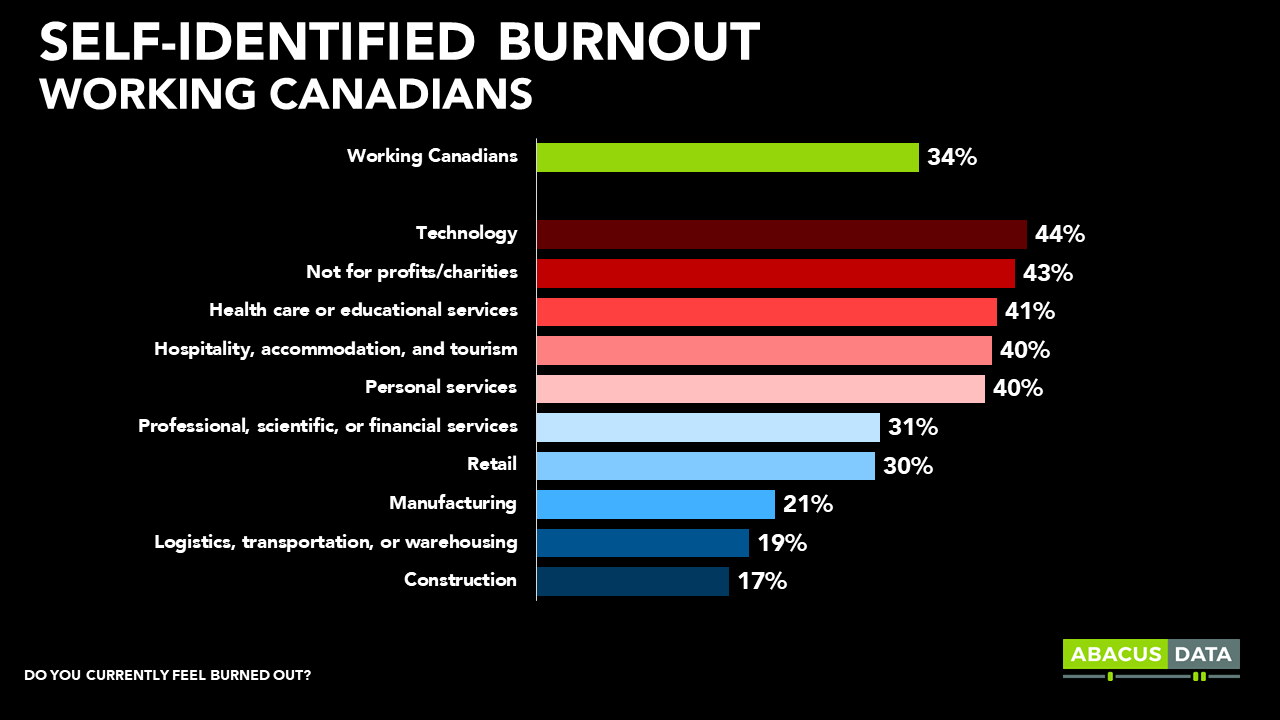
For some, burnout is a constant state, just over 1 in 10 workers report feeling burned out “all the time”. Another 33% feel burned out sometimes. Even among those who don’t feel burned out right at this moment, 30% felt burned out at least once over the past 12 months.
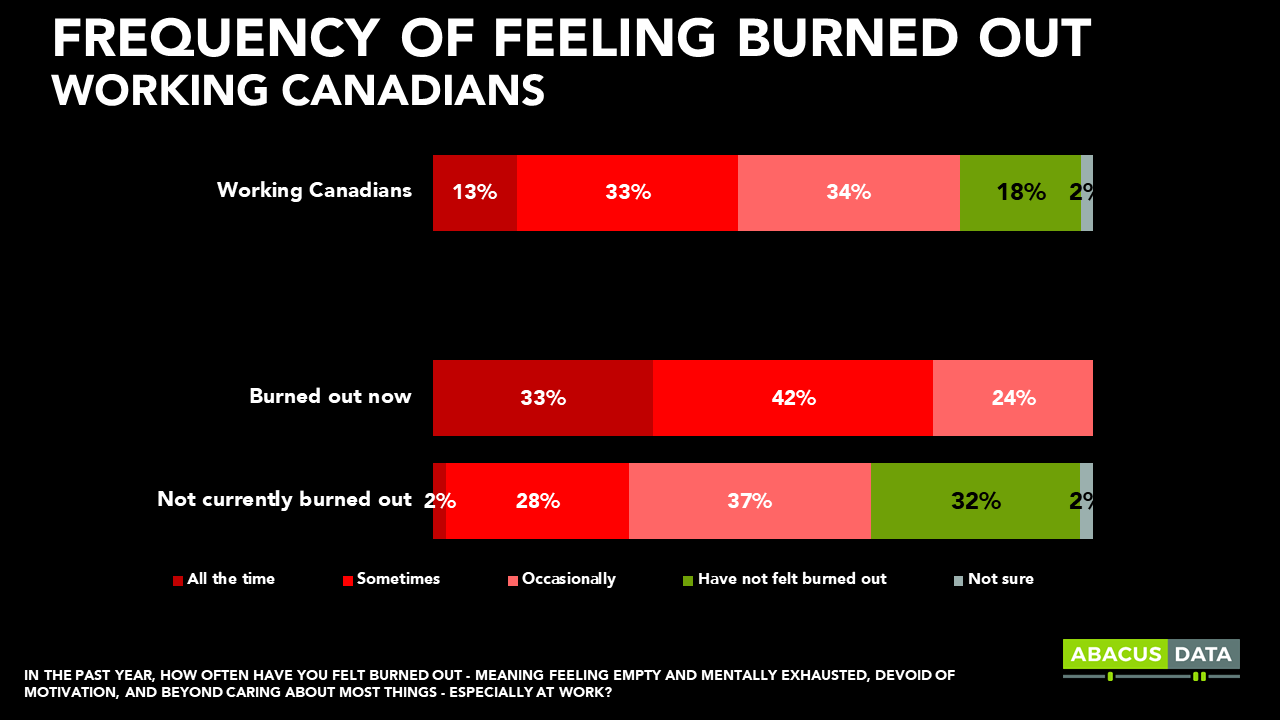
What does burnout look like when it comes to the workplace?
One element is clearly exhaustion. For example, consider the statement, “There are days when I feel tired before I arrive at work.” While 7 in 10 agree at least somewhat with this statement, 90% of those who are burned out feel this way.
Burned out people start their workday tired, drained, and exhausted, even before they tackle any of the items on their to-do list.
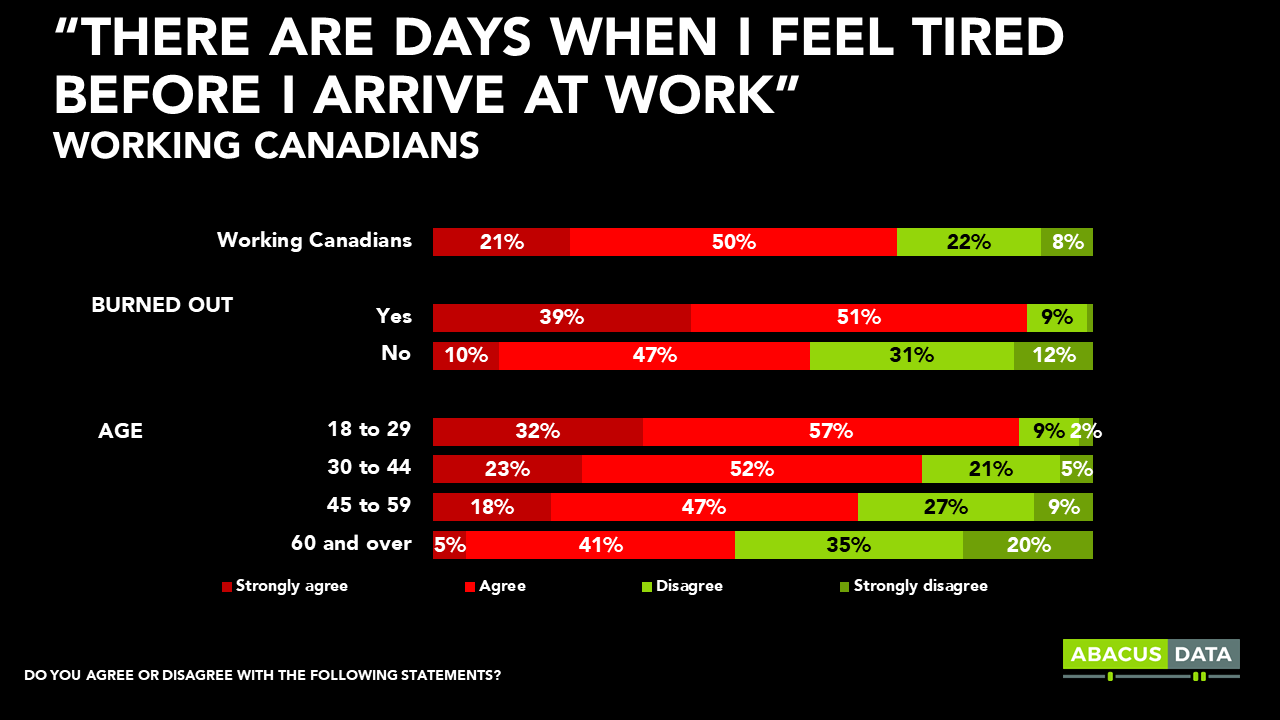
But it’s not just exhaustion, burnout is also about disengagement. Here we see that while most working Canadians agree that they always find new and interesting things in their work, those who are feeling burnout are less likely to feel this way. Among those who report being burned out, only about half say agree they always find new and interesting aspects in their work, 24-points less likely than those who report not being burned out. Note that the differences by age group disappear when it comes to finding new and interesting aspects of work.
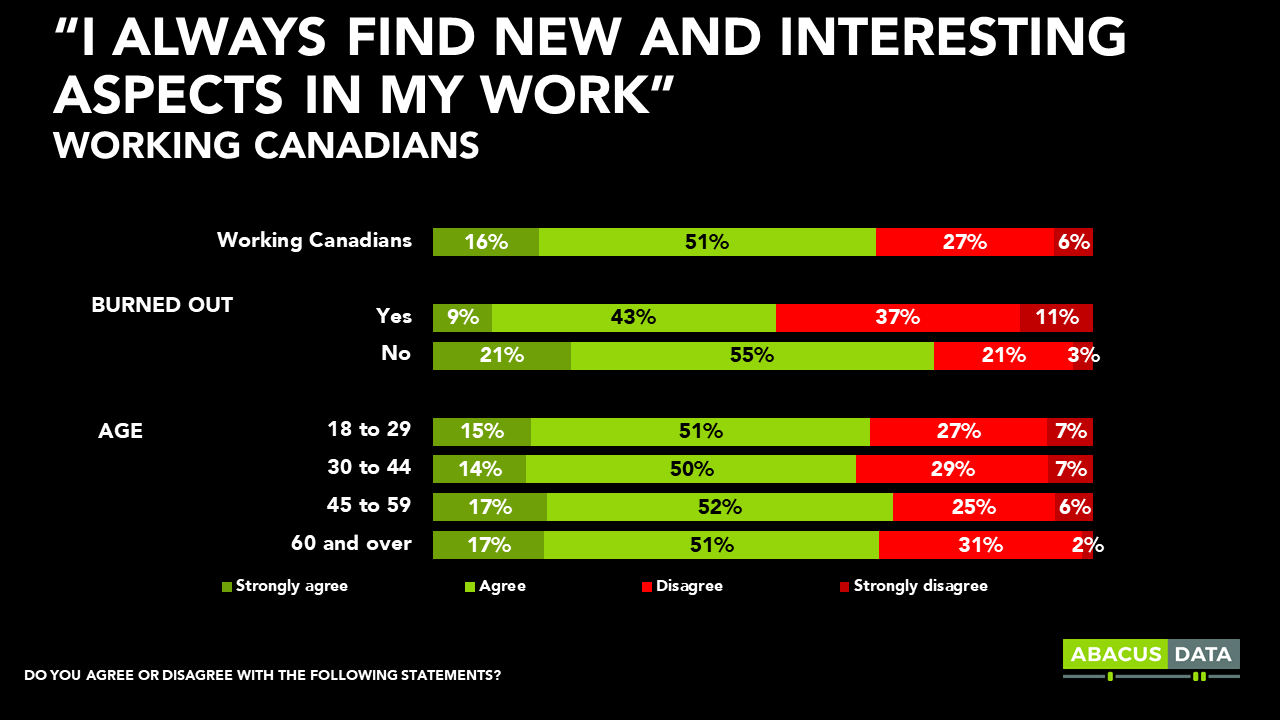
But the differentiation by age group reappears when we talk about actual engagement at work. Six in ten say that they tend to think less at work and do their job almost mechanically. Those who are younger and those feeling burned out are more likely to agree with this statement.
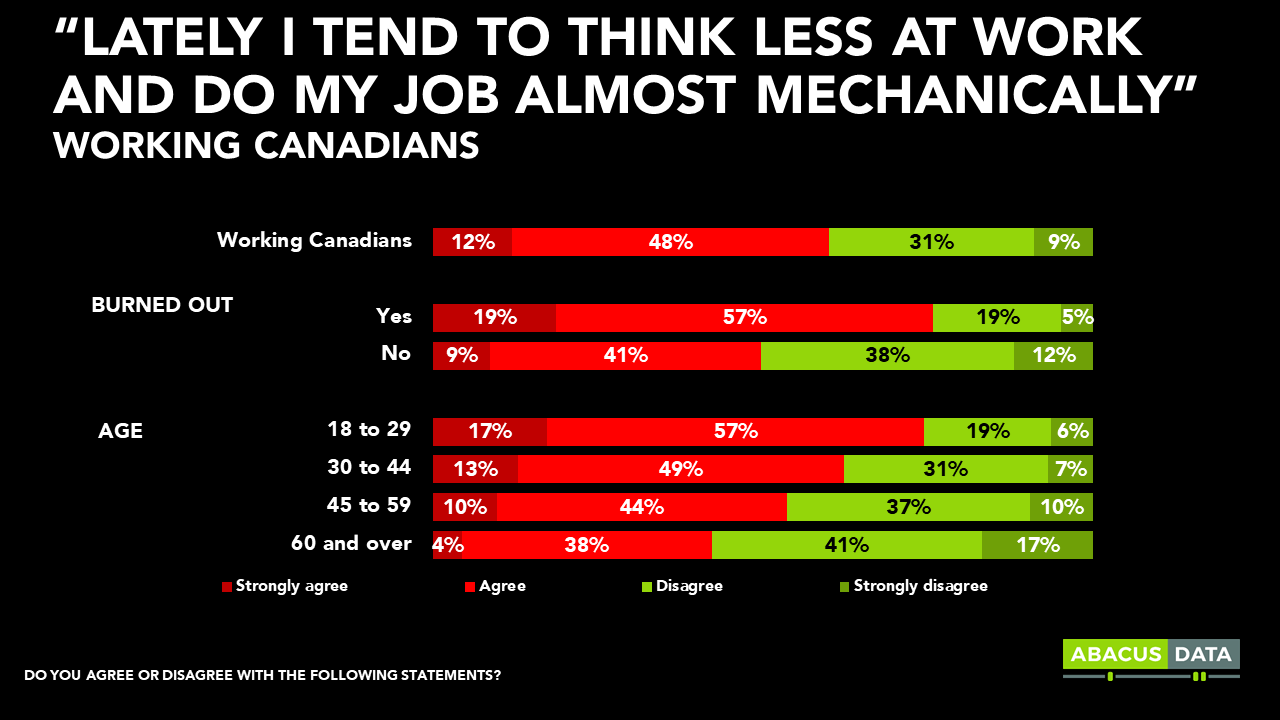
Burnout and Happiness
Burnout at work seeps into the rest of our lives. Using our Happiness Monitor score, we can see that those who are burned out also report being much less happy than those who are not feeling burned out by more than 20 points. This is a huge difference in perceived happiness between the two groups.
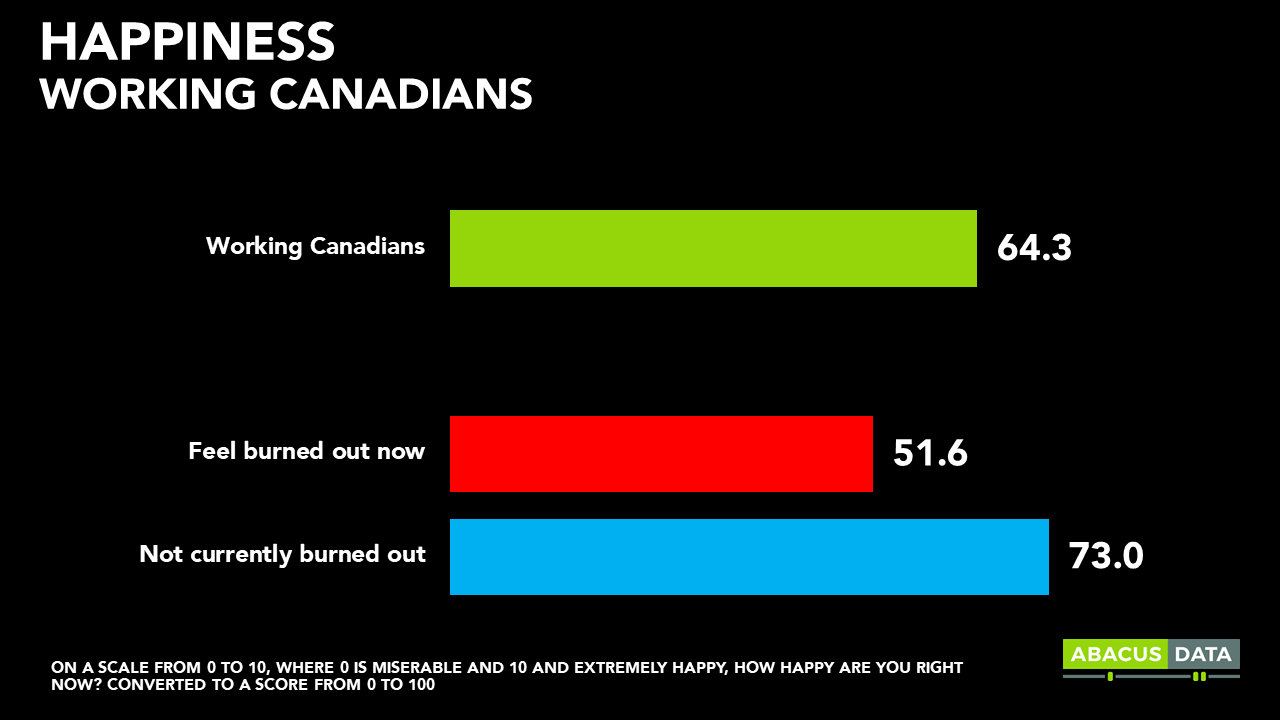
Burnout and Social Cohesion
There is good reason to believe that burnout is not good for Canada’s social cohesion. When we are exhausted and disengaged, we are probably not at our best and that includes our relationships and communities more broadly.
Consider a question we often ask about trust in other people. Overall working Canadians slightly favour the view that you can’t be too careful when it comes to other people. But when we look at those who are feeling burned out, the results tip even further in the direction of wariness of other people.

UPSHOT
If you walk down a street, it’s likely that 3 out of every 10 people you see are feeling burned out right now and more than half have experienced burn out in the past year.
Burnout impacts the quality of our work, how engaged we are with our colleagues, and can impact our relationships outside of work. It makes us impatient, careless, and cranky. Beyond our personal and professional lives, it can also impact our political opinions and how we feel about brands we interact with.
What is most troubling is the high levels of burnout among younger workers. No wonder that so many of them are searching for something as more when half of them tell us they are feeling burned out.
The high level of burnout among those in certain sectors also will present a serious problem for the recovery from the pandemic. Reported burnout among those working in healthcare and education is not surprising given the stress they have been under throughout the pandemic, but what happens if they can’t recover? If these numbers persist, we can expect even more challenging labour shortages in these sectors.
Leaders, recruiters, HR professionals, marketers, communicators, and policy makers should consider this data when thinking about how to engage and communicate with audiences that contain about 1 in 3 who feel burned out, tired all the time, and disengaged.
Do you know if your teams are burned out? If not, we can help and compare your team with the national average in your sector. Send our Vice President of Sales and Marketing, Yvonne Langen, a quick email today and we can connect
METHODOLOGY
The survey was conducted online with 2,100 Canadian adults from January 18 to 21, 2022 including 1201 working Canadians. The margin of error for a comparable probability-based random sample of the same size is +/- 2.14%, 19 times out of 20.
The data were weighted according to census data to ensure that the sample matched Ottawa’s population according to age, gender, educational attainment, and region. Totals may not add up to 100 due to rounding.
Abacus Data follows the CRIC Public Opinion Research Standards and Disclosure Requirements that can be found here: https://canadianresearchinsightscouncil.ca/standards/
The survey was paid for by Abacus Data Inc.
ABOUT ABACUS DATA
We are the only research and strategy firm that helps organizations respond to the disruptive risks and opportunities in a world where demographics and technology are changing more quickly than ever.
We are an innovative, fast-growing public opinion and marketing research consultancy. We use the latest technology, sound science, and deep experience to generate top-flight research-based advice to our clients. We offer global research capacity with a strong focus on customer service, attention to detail and exceptional value.
We were one of the most accurate pollsters conducting research during the 2021 Canadian election following up on our outstanding record in 2019.
Contact us with any questions.
Find out more about how we can help your organization by downloading our corporate profile and service offering.




